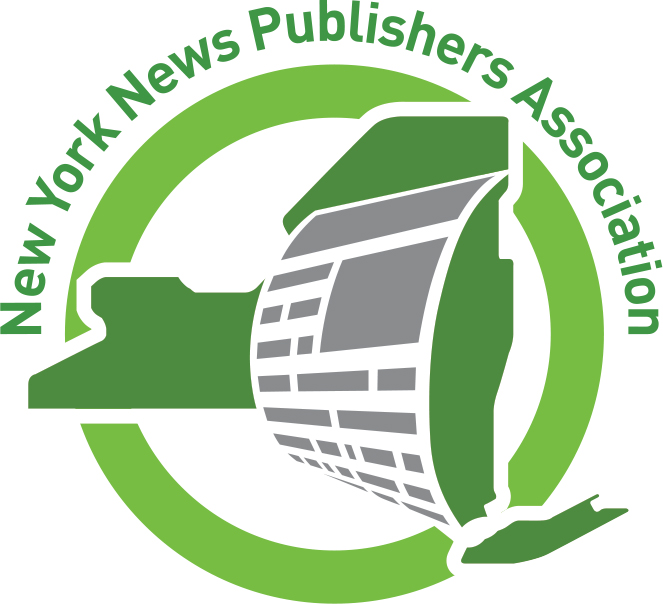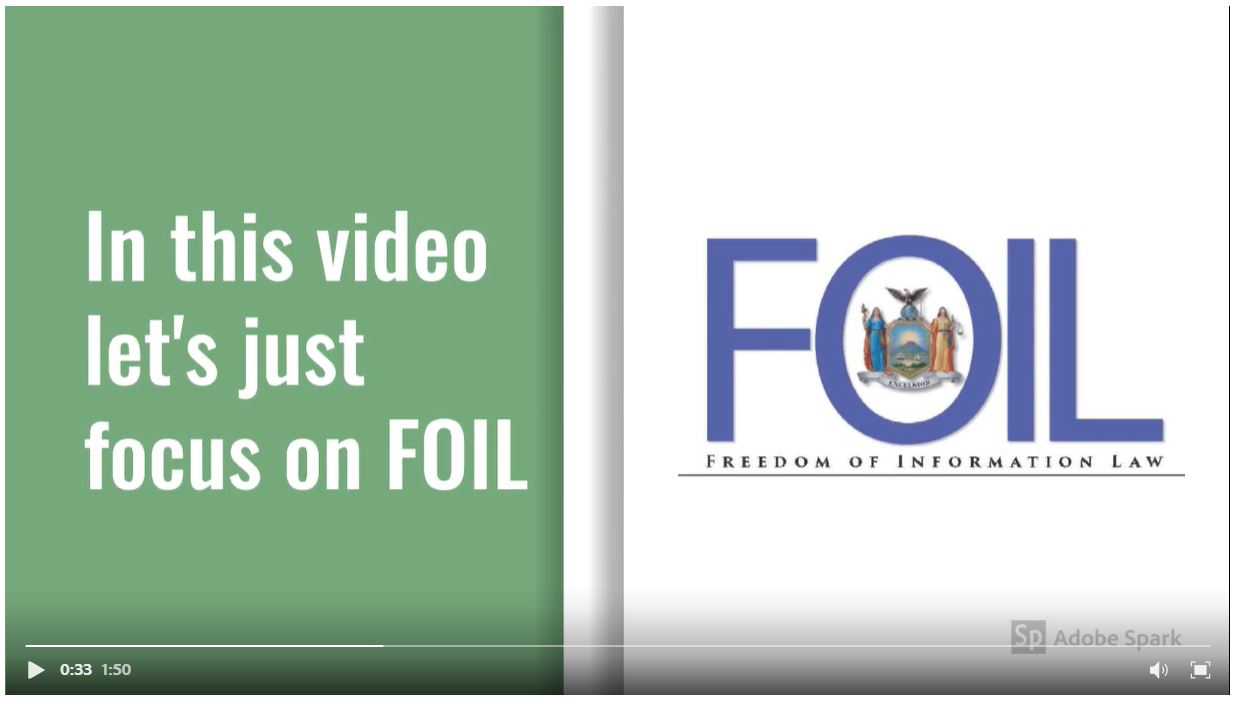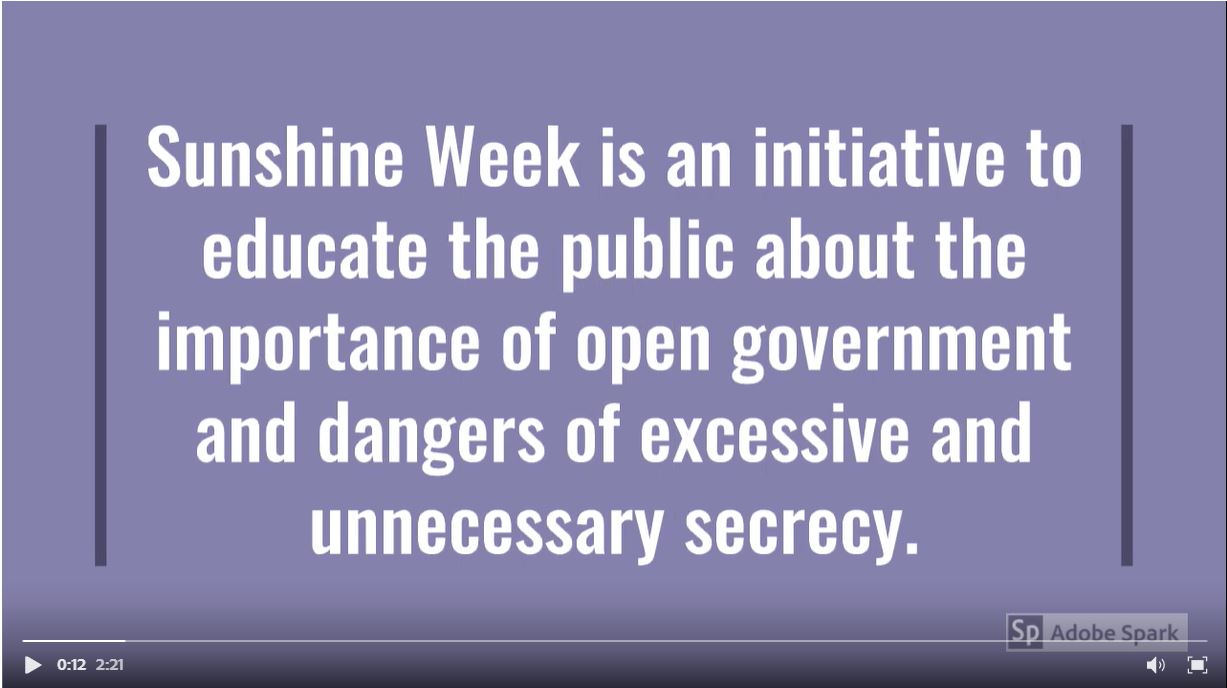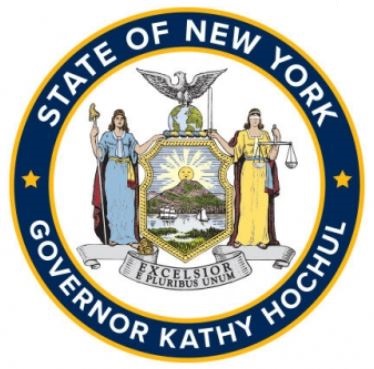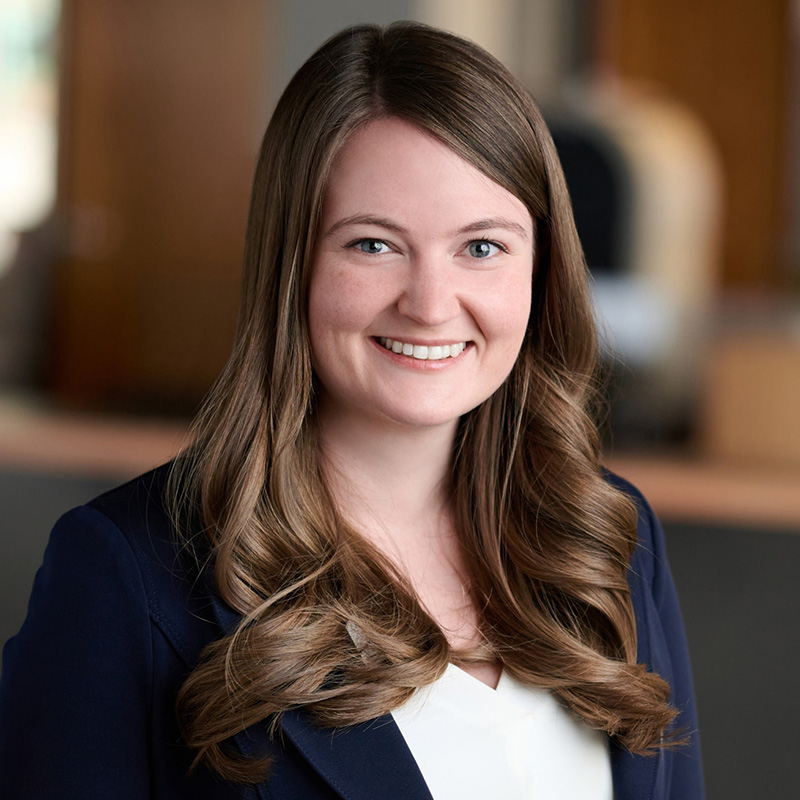|
New York News Publishers Association |
|||
Sunshine Week 2022 - March 13-19
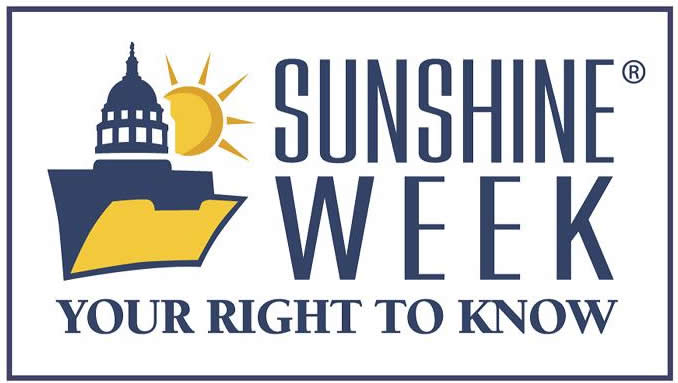
Sunshine Week is a national initiative to promote dialogue about the importance of open government and freedom of information. Participants include news media, civic groups, libraries, nonprofits, schools and all others interested in the public’s right to know. Sunshine Week seeks to enlighten and empower people to play an active role in their government at all levels, and to give them access to information that makes their lives better and their communities stronger.
Click here to access a teaching guide including graphic organizers highlighting Freedom of Information & Sunshine Week.
Click on the image below to view a short video providing a basic summary of New York state's Freedom of Information Law (FOIL).
Click on the next image to view a short video that highlights New York State's Open Meetings Law.
As editorials and editorial cartoons become available, the content will be posted below. This content is available for all NYNPA member publications to reprint with attribution to increase public awareness of Sunshine Week and their right to know.
Mark C. Mahoney, Editorial Page Editor, The Daily Gazette
|
Time to return to in-person meetingsIf you go into stores, other businesses and government offices, you’ll see most people have given up wearing masks as the pandemic winds down (for now). School kids no longer are required to wear them, even though many kids are ineligible for vaccines or have not yet gotten vaccinated. Sports teams and concert promoters have lifted mask and vaccine requirements for their crowded events and basically left responsibility for social distancing to their customers. Restrictions have virtually all been lifted. Yet Gov. Kathy Hochul continues to allow local government boards to hold their public meetings remotely instead of requiring them to return to hosting meetings in person. Why can every other institution flout covid precautions, but government boards — where important decisions that affect everyone’s lives at the grassroots level — still are not required to hold public meetings in person? As the sun sets on another Sunshine Week this year, the governor and Legislature either need to provide a legitimate reason for this narrow exclusion, or remove the option that municipal boards and school boards have to either meet in person or meet remotely. Don’t get us wrong. We’ve been a fan of offering citizens the option of attending public meetings in person or viewing meetings remotely via TV or the internet. Remote meetings, which became necessary and commonplace during the pandemic, opened up government to more people and allowed those who wished to watch from the safety and convenience of their homes to do so. The pandemic actually forced governments to reach out to more people — including the elderly, people with children at home and those whose schedules otherwise prevent them from attending meetings in person - thereby promoting transparency when citizens otherwise might have been shut out during the public health emergency. But nothing can replace the personal interaction and participation of a meeting in which the government officials are in the same room as their constituents, being forced to see their faces and hear their voices and address their concerns in person. No amount of remote questions can replace citizens marching up to the microphone and challenging their officials as they sit before them. Once a meeting is over online, it’s over. But at an in-person meeting, citizens can challenge closed-door executive sessions that are called after the meeting is over and can corner their public officials afterward. Allowing government officials to hide behind the safety of a television camera undermines the democratic process and deprives citizens of their right to address the people who represent them. The governor is expected to extend her directive allowing government boards the option of meeting remotely or meeting in person, perhaps another month. If we can go back to normal almost everywhere else, we can go back to in-person public meetings right now. We don’t need to wait a month from now. Last week, a group of 15 leaders of organizations representing good-government groups, media organizations and others wrote a letter to Gov. Hochul, Senate Majority Leader Andrea Stewart-Cousins and Assembly Speaker Carl Heastie urging them to amend the Open Meetings Law to require both remote and in-person participation in public meetings. The organizations - which included the New York News Publishers Association, Reinvent Albany, Common Cause, the League of Women Voters, the New York Coalition for Open Government, the New York Public Interest Research Group (NYPIRG) and others - offered eight recommendations for hybrid meetings. They want the state to require all state and local public bodies currently subject to the Open Meetings Law to provide free, unrestricted remote video and voice access to their public meetings, including telephone and using web-based video conferencing applications. Another recommendation is that the state require public bodies to post replayable recordings of their meetings online within one business day and retain them online for at least five years - giving residents an opportunity to view meetings shortly afterward if they missed them in real time, and to refer back to them in the future. The recommendations take into account the challenges faced by some government bodies to offer remote meetings due to limitations on their existing websites, broadband capabilities and cost. The group recommends a waiver of two or three years for localities that lack sufficient broadband access and urges the state to require the state Office of Information and Technology Services to offer low-cost applications and lift requirements that meetings be hosted on government owned- or controlled servers. These are common sense, workable measures that restore the benefits to citizens of attending meetings in person and also open public meetings to citizens who are unable or unwilling to attend meetings in person. The governor has made it clear that strict restrictions imposed under the pandemic are no longer necessary. |
|
Close Freedom of Information Law loopholes regarding police recordsGovernments large and small across New York state have become complacent. And with complacency comes ineffectiveness, and insularity and secrecy. Nowhere is that more evident than in public officials' ongoing flouting of the state's Sunshine Laws, which came into being to empower New Yorkers to monitor the effectiveness of their state and local governments. Instead, slowly but surely, adherence to these laws eroded as our elected leaders came to value their own political careers and self-image over the well-being of our people and the places we live. This is a sad state of affairs a half-century past the state's creation of groundbreaking Freedom of Information laws. That 1970s-era effort reflected an era when public involvement was viewed as key to how New York and its communities would meet the challenges of the day. It relied on — and indeed elevated — the idea of government as responsive to the needs of the public. Here in 2022, it is time for the New York state Legislature to elevate once again the concept of open and responsive government as an imperative for the public good. Openness helps the public. Secrecy benefits those with something to hideIt has incontrovertibly become the norm that obtaining public records from state, county, city, town or village governments is akin to pulling teeth for New Yorkers upstate and downstate. Who does that failure to adhere to Freedom of Information Law benefit? Not taxpayers. Not rural residents. Not suburban residents. Not city residents. And certainly not members of marginalized communities and those in need. The ones who benefit tend to be the ones who have the most to hide:
This is not what FOIL's founders intended. Police disciplinary records fall prey to absurd loopholesNowhere is our leaders' embrace of secrecy more evident in the resistance of scores of communities to making public police disciplinary records. You might recall how our leaders in Albany, outraged by the killing of George Floyd on Memorial Day 2020, repealed two weeks later a provision in the law that had kept secret police department's records regarding complaints against officers and how those were handled internally. The USA TODAY Network New York, in conjunction with partners MuckRock, The Brechner Center for Freedom of Information and others, has posted a searchable database of hundreds of police disciplinary records we've obtained from departments large and small since June 2020. Maddeningly, thousands more such documents remain unobtainable because so many local departments and the New York State Police continue to refuse to produce these records, which can shed great light on how well police agencies do or don't uphold their own standards in serving the public. Some departments simply haven't responded as required by FOIL. Many others, however, are hiding behind two absurd propositions:
The first argument falls flat because state legislators seeking more accountability for police understood full well that it is the totality of a police officer's disciplinary record that tells the full story, including revealing patterns of possible misbehavior. And the second proposition is quite weak for the simple reason that a determination of an unsubstantiated complaint is every bit as noteworthy as one that upholds a complaint; both reveal the considerations police agencies make in terms of what constitutes proper officer conduct. More |
From govenor.ny.us Office of Information Technology Services Takes Next Step in Procurement Process for New Software to Expeditiously Process FOIL Requests Hochul Administration Has Committed to Improving FOIL Process and Completed More FOIL Requests Since Taking Office Less Than Seven Months Ago Than Had Been Processed In All Of 2019 Or All Of 2020 Based On Preliminary Data Open FOIL RFQ Here
|
Governor Hochul Announces New Actions to Increase Transparency and Access to Public RecordsGovernor Kathy Hochul announced Monday, March 14, 2022, that New York State is moving forward with improvements to the process of responding to public records requests. Building on efforts announced in October to streamline the Freedom of Information Law process, including directing agencies to proactively post commonly-requested documents online and allowing agencies to respond to FOIL requests without Executive Chamber review, Governor Hochul has directed the New York State Office of Information Technology Services to issue a Request for Quotes to secure a software platform which will accelerate and streamline the State's process for receiving, processing and responding to FOIL requests. The announcement comes during Sunshine Week, an opportunity to spotlight efforts to increase openness and transparency in government. "On my first day in office, I pledged to turn the page on the old ways of Albany and restore New Yorkers' faith in their government,"Governor Hochul said."We're taking meaningful action to streamline the process to access public records, so journalists and members of the public can more easily access information to which they are entitled. While there's always more work to do, I'm proud of the steps my administration has taken to increase transparency and accountability in New York State government." In October 2021, Governor Hochul announced improvements to the FOIL process, with the goal of providing more public records on a faster timeline and reducing the backlog of thousands of FOIL requests inherited by theHochul Administration. Agencies are no longer required to send FOIL responses to the Executive Chamber for review, but instead will process FOIL requests directly through their agency's General Counsel. Agencies are also required to take steps to identify and publicly post frequently requested documents and documents that have public significance, so interested parties can find relevant information without needing to file a FOIL request. The Executive Chamber is reviewing agency requests to fill FOIL staffing and software capacity needs, as well as provide FOIL trainings to all state agencies. Based on preliminary data, more than 400 FOIL requests have been processed and completed by the Executive Chamber since Governor Hochul took office. The Hochul Administration has processed and completed more FOIL requests over the past seven months than in all of 2019 (323 requests completed) and all of 2020 (368 requests completed). Building on this progress, the Office of Information Technology Services today took the next step in the procurement process by issuing an RFQ for a software platform which will serve to accelerate and streamline the State's process for receiving, processing and responding to FOIL requests. Such a software platform will be a major step toward increasing transparency and timely access to public records. The new software platform will use technology to streamline the receipt, processing and response to FOIL requests, thus allowing a more efficient and expeditious process. Now that the RFQ is issued, ITS expects a contract to be finalized in the coming weeks. More |
General Counsel National Press Photographers Association (NPPA)
|
Celebrating Sunshine Week 2022: A Challenge to Openness – An Opportunity to Shine March 14, 2022 - The celebration of Sunshine Week 2022 presents great opportunities to show the significance of this national initiative established in 2005 to educate the public about the importance of open government and the dangers of excessive and unnecessary secrecy. To paraphrase Supreme Court Justice Louis Brandeis, Sunlight is said to be the best of “disinfectants.” Amid the world chaos caused by the coronavirus, that statement rings even more true today. As NPPA members we are reminded to use that light to meaningfully illuminate matters of public interest by promoting the highest standards in visual journalism, acknowledging concern for every person's need both to be fully informed about public events and to be recognized as part of the world in which we live. While many meetings and gatherings are now being scheduled in-person after two years of having been canceled or postponed and people are returning to offices after working from home, it is crucial to remember that visual journalists who by, the very nature of their work, covered so many newsworthy events in-person. During the pandemic they risked their health and safety. Faced now with covering a war in Ukraine, they risk being injured and killed. Through it all, we work to maintain public trust by capturing compelling images by means of fearless, thorough, accurate and ethical journalism. The NPPA Code of Ethics states: “Visual journalists operate as trustees of the public. Our primary role is to report visually on the significant events and varied viewpoints in our common world. Our primary goal is the faithful and comprehensive depiction of the subject at hand. As visual journalists, we have the responsibility to document society and to preserve its history through images.” It is now even more imperative to adhere to those ethics where “photographic and video images can reveal great truths, expose wrongdoing and neglect, inspire hope and connect people around the globe through the language of visual understanding.” It is only through our actions and constant vigilance that the press remains free to shine its light on matters of public concern. By keeping government information open and pushing back against excessive official secrecy, it is an opportunity to show that this is who we are. The National Press Photographers Association (NPPA) is a 501(c)(6) non-profit organization dedicated to the advancement of photojournalism in its creation, editing and distribution. NPPA’s members include television and still photographers, editors, students and representatives of businesses that serve the visual journalism community. Since its founding in 1946, the NPPA has been the Voice of Visual Journalists, vigorously promoting the constitutional rights of journalists as well as freedom of the press in all its forms, especially as it relates to visual journalism. |
Buffalo News Editorial Board
|
Open government laws, libel protections allow the media to keep politicians honest Thomas Jefferson will be forever identified with First Amendment rights due to words he wrote in a 1789 letter to a fellow lawmaker: “Were it left to me to decide whether we should have a government without newspapers or newspapers without a government, I should not hesitate a moment to prefer the latter.” Jefferson became the nation’s third president in 1801, but it is his successor in the White House whose birthday – March 16 – is commemorated as Freedom of Information Day. James Madison, principal author of the Bill of Rights and the fourth president, called freedom of the press “one of the great bulwarks of liberty.” Madison’s birthday is also the reason that Sunshine Week is celebrated at this time in March. Sunshine Week, which runs today through next Saturday, was created in 2005 by the American Society of News Editors – since renamed the News Leaders Association – to promote the cause of open government. The U.S. Freedom of Information Act was signed into law in 1966. New York State’s Legislature passed our Freedom of Information Law in 1972. Both have been amended throughout the years, but their existence still does not guarantee the public’s right to know. Governments’ obligations to disclose public information and the news media’s right to report it are continually being challenged and negotiated. The issues are contested at all levels of government, from a town council or school board inappropriately trying to hide behind secretive executive sessions to former President Donald Trump allegedly pilfering classified documents when he left the White House. The New York Coalition for Open Government, based in Williamsville, did a study on compliance with the Freedom of Information and Open Meetings laws across the state. According to coalition president Paul Wolf, “75% of planning boards reviewed did not post meeting documents online as required; 61% of school board executive session motions did not comply with the law; only 53% of county election boards complied with a Freedom of Information Law request.” The administration of New York’s former governor Andrew M. Cuomo obscured figures on Covid-19 fatalities among nursing homes residents, making the number of deaths look lower than they were by at least 6,000. The Empire Center for Public Policy, which was aggressive in pursuing nursing home data from Cuomo’s Health Department, has accused Gov. Kathy Hochul’s administration of “stalling tactics” in response to its FOIL requests. One of Madison’s legacies is his opposition to the Sedition Act of 1798, which made it a crime to write, print, publish or utter anything false, scandalous or malicious against the U.S. government. Madison and Jefferson denounced the act as contrary to First Amendment principles and the act expired in 1801, after Jefferson’s election to the White House. Another Sedition Act was enacted under President Woodrow Wilson in 1918. Under that law, authorities in Canton, Ohio, arrested Eugene V. Debs in June 1918. The pacificist labor organizer and socialist was convicted and sentenced to 10 years in prison after giving an anti-war speech. Debs appealed but the U.S. Supreme Court upheld his conviction. Congress repealed the Sedition Act in 1921 and Debs’ sentence was commuted. A landmark U.S. libel case, Sullivan v. New York Times (1964), mostly eliminated the crime of sedition. The Supreme Court ruled that to prove libel, a public official had to prove “actual malice” by a critic, meaning they knowingly published something false or with reckless disregard for the truth. The high court extended that principle to “public figures” in 1967 and that standard for libel has stood for five-and-a-half decades. It’s a high bar that allows the news media to pursue truths about government without fear of being prosecuted and jailed by a government official who doesn’t like their reporting. Present-day Russia shows what can happen when no such guardrail exists. Russia’s parliament, at the direction of President Vladimir Putin, just passed a law banning “fake news” about Russia’s invasion of Ukraine. Referring to the war as a war can land a journalist in jail in Russia, which caused several large news organizations to pull their reporters out of the country. The legal protections to journalists in the U.S. established by the Sullivan ruling may be at risk. Former Alaska Gov. Sarah Palin sued the New York Times for libel after a Times editor mistakenly suggested in a 2017 opinion piece that Palin’s rhetoric was linked to a mass shooting. A judge and jury in February both decided against Palin, saying her complaint did not reach the “actual malice” threshold. However, Palin is expected to appeal and two justices on the high court’s conservative majority, Clarence Thomas and Neil Gorsuch, have expressed doubts about the wisdom of the Sullivan ruling. Were Palin’s appeal to make it to the Supreme Court and the court find in her favor, public figures would find it easier to win libel cases. Journalists can make mistakes, and it’s important to correct them promptly, as the Times did in the Palin matter. But the result of public officials being free to use the threat of lawsuits to avoid scrutiny would move us toward the sort of unchecked government that Madison and Jefferson warned against. Sunshine is the disinfectant that helps keep our elected officials honest. It’s worth celebrating this week. |
Shoshanah Bewlay, Executive Director, NYS Committee on Open Government Kristin O’Neill, Assistant Director, NYS Committee on Open Government
|
Recent Changes in Open Meeting LawIn the past six months, the legislature has amended Article 7 of the Public Officers Law (the Open Meetings Law or OML) more frequently than in any other time period in the its 45-year history. While the more well-known modifications involved the authorization of remote meetings as a method of dealing with the public health threat posed by the Covid-19 pandemic, there have been other very important changes in the law, including the posting of minutes and documents to be discussed at an open meeting and to the definition of a public body. A summary of these amendments follows: Remote Meetings On September 2, 2021, Governor Kathy Hochul signed into law Chapter 417 of the Laws of 2021 which, in part, included language “notwithstanding” the “in person” requirements in the OML for most public bodies (the legislature was excluded) and authorized most public bodies “to meet and take such action authorized by law without permitting in public in-person access to meetings and authorize such meetings to be held remotely by conference call or similar service, provided that the public has the ability to view or listen to such proceeding and that such meetings are recorded and later transcribed.” The language of the Law substantially mirrored former Executive Order 202.1, which had been issued in March 2020. Chapter 417 was a temporary measure designed to permit the legislature to take up additional legislation when session reconvened in January 2022 and expired by operation of law on January 15, 2022. On the eve of the expiration of Chapter 417, on January 14, 2022, Governor Hochul signed into law Chapter 1 of the Laws of 2022, which amended Chapter 417 of the Laws of 2021 to authorize any public body (as that term is defined by OML § 102(2), this time including the legislature) “to meet and take such action authorized by law without permitting in public in-person access to meetings and authorize such meetings to be held remotely by conference call or similar service, provided that the public has the ability to view or listen to such proceeding and that such meetings are recorded and later transcribed.” Chapter 1 took effect immediately and will expire and be deemed repealed upon the expiration or termination of the state disaster emergency declared pursuant to Governor Hochul’s Executive Order 11 or any extension or modification thereof. As of the writing of this article, Executive Order 11.3 had extended Executive Order 11 through March 16, 2022. Unless the legislature acts to more permanently modify the OML to include provisions for remote meetings, upon the expiration of Chapter 1 all public bodies will be required to comply with the “in person” provisions of the OML as they existed before March 2020, when those provisions were first suspended. Records Scheduled to be Discussed On October 19, 2021, the Governor signed into law Chapter 481 of the Laws of 2021 which amended § 103(e) of the OML to require that records scheduled to be discussed at a meeting be made available to the extent practicable (upon request and posted online) at least 24-hours before the meeting. Many people believe that this amendment to the OML represents a new requirement. However, the obligations to make records available to the public upon request “prior to or at the meeting” and to post the records on the agency or public body website “prior to the meeting” have been in effect since February 2012. This amendment simply places a 24-hour minimum time frame for making those records available. Additional guidance can be found on the Committee on Open Government website. Posting of Meeting Minutes On November 8, 2021, the Governor signed into law Chapter 587 of the Laws of 2021 which amended the OML to require agencies that maintain a website and use a high-speed internet connection to post meeting minutes on their website within two weeks of the date of the meeting, or within one week of an executive session. It further states that “for purposes of this subdivision unabridged video recordings or unabridged audio recordings or unabridged written transcripts may be deemed to be meeting minutes. Nothing in this section shall require the creation of minutes if the public body would not otherwise take them.” Many have asked whether this amendment means that public bodies need no longer prepare minutes. In our opinion, this provision does not relieve the public body from the obligation to prepare minutes as required in other provisions of the OML. See §§ OML 106(1) and 106(2). Rather, for purposes of the posting requirement only, a public body may post to its website an unabridged video or transcript instead of the minutes it is otherwise required to prepare and make available upon request. Definition of Public Body On December 21, 2021, the Governor signed into law Chapter 676 of the Laws of 2021 which amended the definition of “public body” contained in the OML to mean:
Public Officers Law § 102(2) (amendments shown in underline). This amendment essentially codifies judicial precent and the opinions of the Committee that have consistently advised that a body which performs a necessary governmental function should not, by a technicality or otherwise, be exempt from the requirements imposed upon a “public body.” The definition changed again on February 24, 2022, when the Governor signed into law Chapter 115 of the Laws of 2022, which made clarifying changes to Chapter 676 of the Laws of 2021 to specify that the recently-defined entity performing a “necessary function in the decision-making process” must also consist of two or more members and operate by a quorum (like other public bodies already defined in the law). |
Natalie Seales First Amendment Law and Policy Fellow, News Media Alliance
|
Congress Should End Restrictions to Public Records by Passing the Free PACER BillIf you’ve ever had the good fortune of doing legal research, you’ve likely had an encounter with PACER. PACER, or Public Access to Court Electronic Records, is the electronic service that provides access to court records. These records are pivotal for journalists providing accurate and quality news. PACER provides original, verifiable sources that answer journalists’ questions or help them understand the right questions to ask on important issues. During Sunshine Week and every day, journalists need easy access to verifiable sources more than ever to report the truth about government activity to the public. But unfortunately, PACER is far from perfect. Anyone who has used PACER can testify to its antiquated design, clunky search functions, and difficult-to-navigate software. There are also separate databases for different courts, meaning there is no uniform way to file, track or save information about a case. Perhaps even worse than providing a below-average product, PACER charges fees for every search and document download, at a rate of $0.10 per page. While 10 cents may not seem like much, some searches garner many pages of search results, and court filings are known for their length. Though PACER’s fees are capped at $3.00 per document, these fees add up. The electronic system is entitled to charge these fees by statute, but the fees are to be imposed “only to the extent necessary,” and must be “reasonable.” But with PACER bringing in about $142 million annually in revenue, it seems these fees are neither “necessary” nor “reasonable.” Now, a Bill is moving through Congress to address the problems with PACER. The Open Courts Act of 2021, or Free PACER Bill, will not only eliminate the fees currently associated with PACER, but it will also modernize the antiquated search engine. While PACER is now clunky, dated and hard to use, the Act will ensure an updated, reliable, streamlined site to file, read and monitor court documents and dockets. The Bill has garnered bipartisan support. Senator Rob Portman (R-OH) said, “PACER was intended to create a level playing field for small-time litigants, small business, civil society, journalists, and citizens who care about transparency in government. However, with its frustrating interface and fees, PACER has done the opposite. The American people should have easy access to the court records of their country, and this bipartisan, consensus legislation will fix the problem once and for all by putting in place a free, streamlined system with an emphasis on security, accessibility, affordability, and performance.” More |

Cartoon courtesy of Adam Zyglis, The Buffalo News
Citizen Editorial Board The Citizen Editorial board includes president and director of local sales and marketing Michelle Bowers, executive editor Jeremy Boyer and managing editor Mike Dowd.
|
Most local governments breaking this sunshine lawNew York state law regarding the online disclosure of records related to public meetings is clear: "If the agency in which a public body functions maintains a regularly and routinely updated website and utilizes a high speed internet connection, such records shall be posted on the website to the extent practicable at least twenty-four hours prior to the meeting." We know almost all of the government bodies in Cayuga County fall under the category of an agency that has a routinely updated website with high speed internet. But with exceptions that can be counted on one hand, government bodies in Cayuga County are failing to disclose the records that will be discussed at public meetings. The point of the meetings record provision of the law is basic common sense. Without the meeting documents, it's hard for anyone who is not a member of the board holding the meeting to understand what's being discussed and subjected to votes. Unfortunately, the open meetings law offers little recourse for the public to get agencies to follow this provision. We urge state legislators and the governor to work with good government advocates to fix that problem. Perhaps there's even a few state dollars in the now-large surplus New York enjoys to motivate local compliance. The more effective solution, though, might be one that's driven by the constituents these government bodies serve. We encourage our readers to check out their local government body websites (this includes school districts and authorities) to see what they can find regarding scheduled meetings. If they can't easily access agendas that include the full text of resolutions and documents related to those resolutions, contact the government and demand that they start following the law. But we bring this matter to our readers' attention now because today kicks off an important week for raising awareness about government transparency. Sunshine Week is a "non-partisan, non-profit national initiative begun in 2005 by the American Society of News Editors — now News Leaders Association to promote a dialogue about the importance of open government and freedom of information," the News Leaders Association states. "Participants have included news media, civic groups, libraries, nonprofit organizations, schools and individuals concerned about the public's right to know." Visit www.newsleaders.org/sunshine-week-about, follow @SunshineWeek and look for #SunshineWeek hashtags on Twitter. And stay tuned to this opinion section and those of newspapers throughout the country for more columns about this topic. |
Mark C. Mahoney, Editorial Page Editor, The Daily Gazette
|
Sunshine Week: Fight for your right to knowGetting government to be open with the people it serves has always been a Sisyphean effort - rolling a large rock up a hill, only to have it roll back down right when it got near the top. And over the last few years, it seems, the rock has gotten bigger, the hill created by government has gotten steeper, and the number of people pushing the rock - journalists, citizen advocates, government officials sympathetic to transparency efforts - has gotten smaller. More and more, it seems, government officials want to keep the public from information they need to know and deserve to know. Government officials exploiting new technology to communicate in secret. Government officials hiding and manipulating statistical information that might save our lives. Government officials ignoring existing transparency laws, and forcing citizens to undertake expensive and time-consuming legal action to obtain information in hopes of discouraging them and forcing them to give up seeking it. Government officials unnecessarily and illegally delaying the release of public information in hopes the citizens will eventually no longer need or want the information. Government officials opposing or seeking to undo the open government laws to make it more difficult for the public to seek and obtain information - often hiding behind a concern for personal privacy or the threat of jeopardizing law enforcement investigations to justify closing off public access to records. Government officials whining about public criticism for their lack of transparency. The news on the open government front lately in New York hasn’t been all dire. Gov. Kathy Hochul has pledged to operate a more open government than her predecessor, Gov. Andrew Cuomo. By just pledging to be more transparent, she’s invited the spotlight on herself and her administration - a positive development. And while she’s gotten off to a slow start, she has made changes in open government laws to give citizens more access to records and to give citizens a better opportunity to be successful in challenging attempts to keep records secret. For that, she deserves credit, and we encourage her to continue down this road. Thanks to the pandemic, citizens can view their government in action without leaving their homes through state-mandated remote telecasting of meetings. While it’s not as easy to call out public officials online as it is by attending meetings in person, this technological shift does make it easier for more people to watch their government in action and become involved. But there is so much more that needs to be done. It’s tempting for us all, in the face of push-back from government officials, to just stop fighting, to leave the rock at the bottom of the hill and walk away. But the results of that would be tragic, and against our own self interests. It’s appropriate that we in the journalism community use the start of Spring to host Sunshine Week - the week we remind the citizens of their right to know and remind government officials of their obligation to be transparent and cooperative with the citizens they serve. Sunshine Week. Shine the light on government. Sunshine, the best disinfectant to combat dirty politics. It serves as a reminder that we have a right to know what government is doing, how it’s spending our money, what information it’s using to base its decisions upon. That we have a right to ask for information and to have it provided to us in a timely manner. That we have a right to attend meetings and to review the same documents that public officials are reviewing in real time so we know how decisions are being made and what questions to ask. Journalists have always been at the front lines as watchdogs against government secrecy. But these days, there are fewer of us — a situation that many in government routinely exploit. We in New York still have strong press associations like the New York News Publishers Association and the New York Press Association fighting for laws to make government more open, to make more information available and to make it easier for citizens to access information. But if we as citizens want transparency, we can’t leave it to others. More than ever, citizens need to be their own advocates. Citizens also can band together to help one another. A recently formed group of citizens from around the state regularly shares its experiences, expertise and collective efforts to fight for open government. They’re called the New York Coalition for Open Government. They do research and share ideas and information, and they advocate for transparency. And government officials can be more transparent and avoid dealing with time-consuming requests for information by upgrading their websites to make it easier for them to post more information online in a timely manner. The more information that citizens can access on their own, the less they have to ask for. We’d also like to point out that while many government officials try to hide their actions from public scrutiny, not all are trying to push the rock down the hill. Many well-intended, honest public servants - elected officials appointees and staff - understand their obligation to be transparent and work with the citizens to provide them with the information they want and deserve. They should be recognized and applauded. If Sunshine Week accomplishes anything, we hope it reminds you, the citizens, of your right to know what your government is doing, your right to demand information, and your obligation to fight for open government yourselves. And we hope it reminds public officials of their obligation to serve the citizens above themselves by honoring and fulfilling the public’s right to know. Keeping government transparent is an uphill battle. But it’s one we must continue to wage, and one that’s worth the struggle. |
NYS Sunshine Week Chair, Carolyn James, Editor Massapequa Post, Babylon Beacon, Amityville Record Newspapers
|
We have to protect the public’s right to knowHere’s the good news: The Nassau and Suffolk boards of elections provided minutes from their meetings following a Freedom of Information Law request made by the New York Coalition for Open Government. The request was part of an overall review of compliance by these boards to FOIL and Open Meetings Laws throughout New York State. Only 10 out of 19 boards of elections provided meeting minutes, a success rate of 53 percent. Here’s the bad news: The initial request by NYCOG was sent to the boards on July 14, 2021. Nassau acknowledged receipt of the request on July 21, while Suffolk did not respond at all. A second request was made on August 18. This time Suffolk responded the next day. County election boards are subject to the Freedom of Information Law and are required to respond to FOIL requests within five business days of receiving them. The response must acknowledge the request and provide a timeframe by which the information will be provided or deny the request and provide the method of appeal. NYCOG is recommending that the New York State Legislature make it clear that the New York State Board of Elections is required to conduct business through public meetings. Boards of elections are not the only entities in New York that disregard FOIL and Open Meetings Laws. It happens every day, as many reporters and even members of the public know and have experienced. Some government entities are vigilant in abiding by the law, while others routinely dismiss their legal obligations under FOIL. Recently the Suffolk County Police Department moved forward by putting into place a system whereby the public has easy access to all documents that are within the public purview. This is in addition to continuing to support a public information office that is responsive to the law and to the public’s right to know since the law was adopted. Unlike Suffolk, Nassau maintains a systemic, archaic system that completely disregards the department’s legal obligations under FOIL. They continue to do so offering unacceptable reasons such as their computer systems are not set up to provide this information to the public and their method of responding to requests for legitimate information or documents is to pass the buck. Here’s the good news: We continue to have organizations such as NYCOG monitor public entities for compliance to ensure the public’s right to know is practiced, protected and preserved. Here’s the bad news. Some, like the Nassau County Police, will not do so until the law changes to include penalties for those who violate the law or public officials use their power to demand better of them. |
Please note: Previous Sunshine Week content is still available for download and use.
Click here to access the eight newspaper in education features created for 2012 (3 column x 8 inches) - an overview of NYS FOIL, Open Meetings, How to gain access to records and one freature on Freedom of Information and NYS Courts.
Click here to access the five-part series of features highlights just a few of the websites with reports and other data that may be of interest to students and the general public. Graphic organizers to accompany these features are also available here as PDF download. The topics included:
• What is “E-Government”? – A brief summary of our “Cyber Sunshine” focus
• Vehicle Safety – Highway Safety Data
• Food Safety – Restaurant Inspection Reports
• School Safety – Violence and Disruptive Incident Report
Finally, click here to access five public service announcements in PDF format (2 columns x 6 inches) that can be use to promote Sunshine Week
If you'd like to make a donation to the NYNPA Newspaper In Education program, simply press the Donation button below.
New York News Publishers Association, Inc.
Phone/Fax (518) 449-1667 - Toll-free: (800) 777-1667
